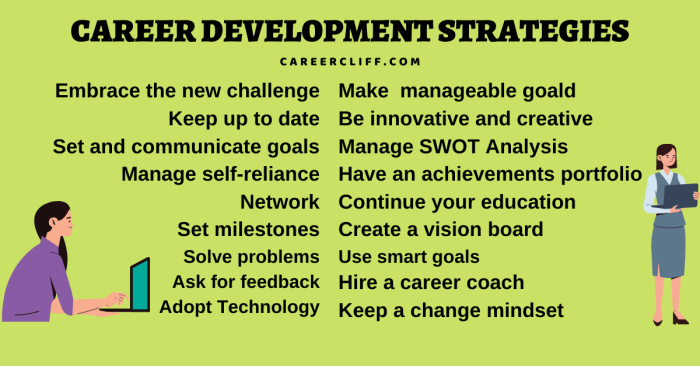Career Growth Strategies are essential for reaching your full potential and advancing in your career. From setting clear goals to overcoming challenges, these strategies can pave the way for success in the professional world.
Importance of Career Growth Strategies

Having effective career growth strategies is crucial for professional development because it helps individuals navigate their career paths, set achievable goals, and progress towards success.
Achieving Long-Term Goals
Career growth strategies play a vital role in helping individuals achieve their long-term goals by providing a roadmap for advancement and growth. By setting clear objectives and milestones, professionals can track their progress and make necessary adjustments to stay on course.
Successful Professionals Benefiting from Career Growth Strategies
- Elon Musk: The CEO of Tesla and SpaceX, Elon Musk, is known for his strategic approach to career growth. By continuously seeking new challenges and opportunities, Musk has been able to expand his influence and impact in various industries.
- Sheryl Sandberg: As the COO of Facebook, Sheryl Sandberg has implemented effective career growth strategies throughout her career. By prioritizing mentorship, networking, and continuous learning, Sandberg has successfully climbed the corporate ladder and made significant contributions to the tech industry.
- Oprah Winfrey: Media mogul Oprah Winfrey is a prime example of how career growth strategies can lead to extraordinary success. Through her focus on personal branding, authenticity, and philanthropy, Winfrey has built a multi-billion dollar empire and established herself as a global icon.
Types of Career Growth Strategies

When it comes to advancing in your career, there are various strategies you can employ to help you reach your goals. Here are some key types of career growth strategies that can make a difference:
Skill Development
One of the most important career growth strategies is continuously developing and improving your skills. Whether it’s through formal education, online courses, or on-the-job training, enhancing your skill set can open up new opportunities and help you stay competitive in the job market.
Networking
Building a strong professional network is another essential strategy for career growth. Networking can help you establish valuable connections, learn from others in your field, and discover new career paths. Attending industry events, joining professional organizations, and leveraging social media platforms are all effective ways to expand your network.
Continuous Learning
Embracing a mindset of continuous learning is crucial for long-term career growth. Staying curious, seeking out new knowledge, and being open to feedback can all contribute to your professional development. By staying informed about industry trends and advancements, you can position yourself as a valuable asset to employers.
Setting Clear Goals and Milestones
Setting clear, achievable goals and milestones is a powerful strategy for career growth. By defining what you want to accomplish and breaking it down into smaller steps, you can create a roadmap for success. Regularly reviewing and adjusting your goals can help you stay focused and motivated on your career path.
Adapting to Change and Embracing New Opportunities
Flexibility and adaptability are key components of successful career growth strategies. In today’s rapidly changing job market, being willing to adapt to new technologies, trends, and opportunities can help you stay ahead of the curve. Embracing change and stepping out of your comfort zone can lead to exciting new possibilities for advancement.
Implementing Career Growth Strategies
Now that we’ve explored the importance and types of career growth strategies, let’s dive into how you can actually implement these strategies to advance your career.
Creating a Personalized Career Growth Plan
When creating a personalized career growth plan, follow these steps:
- Assess your current skills, strengths, and weaknesses.
- Set specific, measurable goals for your career advancement.
- Identify the steps and actions needed to achieve your goals.
- Create a timeline and milestones to track your progress.
Leveraging Mentors and Professional Development Resources
Utilize mentors and professional development resources to implement career growth strategies effectively:
- Seek guidance and advice from experienced professionals in your field.
- Attend workshops, seminars, and courses to enhance your skills and knowledge.
- Build a strong professional network to access new opportunities and insights.
Significance of Self-Reflection and Feedback
Self-reflection and feedback play a crucial role in refining your career growth strategies:
- Regularly evaluate your progress and adjust your plan as needed.
- Seek feedback from mentors, colleagues, and supervisors to gain different perspectives.
- Use constructive criticism to improve your performance and approach to achieving your goals.
Overcoming Challenges in Career Growth: Career Growth Strategies
When striving for career growth, individuals often face various challenges that can hinder their progress. Overcoming these obstacles is essential to achieving success in one’s professional journey. Here, we will explore common challenges and effective strategies to navigate them.
Fear of Failure, Career Growth Strategies
- Acknowledge the fear: Recognize that fear is a natural response to stepping out of your comfort zone.
- Set realistic goals: Break down your career growth objectives into smaller, achievable tasks to build confidence.
- Seek support: Surround yourself with mentors or peers who can provide encouragement and guidance.
- Learn from setbacks: View failures as opportunities for learning and growth rather than as roadblocks.
Lack of Motivation
- Identify your passion: Reconnect with what drives you and align your career goals with your interests.
- Create a routine: Establish a schedule that incorporates activities that energize and inspire you.
- Reward milestones: Celebrate small victories along the way to maintain momentum and motivation.
- Visualize success: Imagine the positive outcomes of achieving your career growth objectives to boost motivation.
Imposter Syndrome
- Challenge negative thoughts: Reframe self-doubt with evidence of your accomplishments and capabilities.
- Share experiences: Open up to trusted individuals about your feelings of inadequacy to gain perspective and support.
- Focus on growth: Embrace continuous learning and improvement as part of your professional journey.
- Practice self-compassion: Be kind to yourself and acknowledge that perfection is not a realistic standard.
Resilience and Perseverance
- Cultivate resilience: Build your ability to bounce back from setbacks and adapt to challenges.
- Maintain a growth mindset: View obstacles as opportunities for growth and development rather than as failures.
- Persist in the face of adversity: Stay committed to your career goals and keep moving forward despite obstacles.
- Celebrate progress: Acknowledge and appreciate the progress you make on your career growth journey to stay motivated.